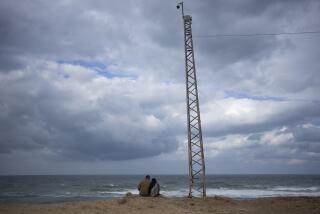Japan Seeks Mideast Role, Israelis Told : Tokyo Urged to ‘Adopt’ Refugee Camp in $10-Billion Aid Plan
- Share via
JERUSALEM — Japan expects to dispense $10 billion annually in various forms of foreign aid over the next five years, and it hopes part of that sum will support its bid for a greater political role in the Middle East, a senior government official told Israeli leaders Sunday.
Speaking during the first-ever visit to Israel by a senior Japanese government official, Foreign Minister Sosuke Uno made the disclosure during a one-hour meeting with Israeli Prime Minister Yitzhak Shamir, according to Shamir’s spokesman.
“The Japanese foreign minister told the prime minister that Japan is going over the next five years to allocate the sum of $50 billion, which is an enormous sum, for assistance to other parts of the world and that Japan is now taking a greater interest in regional problems and wants to be of help,” spokesman Avi Pazner said.
By comparison, the United States dispenses about $13 billion annually in various types of assistance to foreign nations.
Concern Over Conditions
Uno coupled his aid statement with expressions of concern over the condition of a Palestinian refugee camp that he also saw during a whirlwind, 22-hour visit.
“He told us how he visited the Dahaisha refugee camp (near Bethlehem in the Israeli-occupied West Bank) and he was horrified by what he saw there,” Pazner commented. “And Shamir said: ‘We have been horrified for a long time about that, and we were trying to do something about it. And we were calling for an international effort to better the situation. But it is a costly effort. And we would be very pleased if Japan, in the framework of a new policy of more involvement in different parts of the world, could join in such an effort, to better the lot of these people and to resettle them in new housing.’ ”
About 350,000 Palestinians live in refugee camps on the West Bank and the occupied Gaza Strip, including more than 7,000 at Dahaisha. It has been estimated that it would cost $2 billion to resettle the Gaza Strip’s 250,000 camp residents alone.
Meanwhile, resettlement is a politically controversial step opposed by many Palestinians who say that to agree to resettlement would be tantamount to accepting Israeli occupation of the homes from which they were displaced.
Israeli President Chaim Herzog urged Uno to “adopt” a Palestinian refugee camp and finance its rehabilitation, according to Israel Radio. “The guest listened politely and made no promise,” state radio added.
Pazner said that Uno did not react to Shamir’s suggestion, either.
The only public pledge that the Japanese official gave was of $500,000 to aid U.N. relief efforts in the territories and to build a new community center in Dahaisha. “I am fully aware of your indefatigable way of life under the difficult conditions in the refugee camp and of the severe situation in the West Bank and Gaza since last December,” Uno told a small group of camp residents.
Uno was referring to the Palestinian uprising, which began last Dec. 9 and which continues unabated despite more than 200 Palestinian deaths, thousands of injuries and the imprisonment of more than 5,000 Arab residents of the territories for uprising-related activity. One Israeli soldier and two Israeli civilians have also been killed during the unrest.
Arab states reportedly expressed displeasure in Tokyo over Uno’s visit. And the radical Japanese Red Army, which has ties to militant Palestinian groups outside the country, charged that it was timed to weaken the uprising.
But Japanese officials depicted the trip as an expression of the government’s desire to promote peaceful coexistence between Arabs and Israelis.
Israel and Japan established diplomatic relations in 1952, but after the 1973 Arab-Israeli War, Tokyo, which is economically dependent on Mideast oil, tilted its foreign policy toward the Arab side. Both Shamir and Foreign Minister Shimon Peres complained bitterly to Uno on Sunday that Japan remains the only major industrial democracy that adheres in significant measure to an Arab-inspired boycott of trade with Israel.
Shamir and Peres also criticized Japan’s support of the Palestine Liberation Organization as the “sole legitimate representative” of the Palestinian people and its position that Israel should return all of the territory it occupied after the 1967 Arab-Israeli War.
Uno restated Japan’s basic Middle East policies, although Peres said he expected them to be “reconsidered” as a result of the visit.
More to Read
Sign up for Essential California
The most important California stories and recommendations in your inbox every morning.
You may occasionally receive promotional content from the Los Angeles Times.













